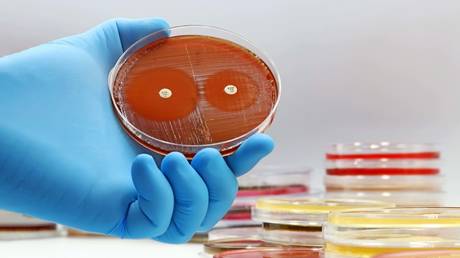German physicians express concern over increasing antibiotic resistance – Bild
As drug-resistant bacteria continue to proliferate, a significant portion of research and development for new treatments has shifted from the EU to China.. source:TROIB RTS

German doctors have issued warnings that the world may be reverting to conditions akin to the pre-penicillin era. The groundbreaking discovery of penicillin in the late 1920s significantly enhanced human lifespan by combating bacterial infections. However, this progress is now reportedly at risk.
“We are currently losing the achievements of modern medicine and falling back into the time before the discovery of penicillin,” stated Mathias Pletz, head of the Paul Ehrlich Society for Infection Therapy.
“Antibiotics were the greatest achievement of medicine ever,” remarked Professor Yvonne Mast, a microbiologist and researcher at the Leibniz Institute in Braunschweig. “The fact that more and more resistance is now emerging and new antibiotics are lacking is a major threat.”
A study referenced by the German outlet Bild predicts that antibiotic-resistant pathogens could lead to as many as 39 million deaths worldwide by 2050. Currently, these infections are responsible for 35,000 fatalities in the EU annually.
Professor Frank Brunkhorst of the Jena University Hospital highlighted that one contributing factor to this issue is the overprescription of antibiotics for outpatient procedures. He noted that antibiotics are largely ineffective against most respiratory infections, which are typically viral.
“Second, many resistant germs are coming to us due to international travel, which is booming again after [Covid],” Brunkhorst noted, emphasizing that resistant strains are particularly prevalent in countries such as Greece, Portugal, Turkiye, India, and other Asian nations. He cautioned that travelers returning to Germany could inadvertently bring back “life-threatening” germs for their grandparents.
The slow development of new antibiotics is another challenge, as the research process is lengthy and expensive, with profits often insufficient to justify the investment, according to Professor Mast. She pointed out that only 12 new medications have been approved since 2017.
As reported, only one in 5,000 substances reaches the market, with development timelines spanning 8 to 15 years and R&D costs potentially reaching up to $2 billion. Mast has called for more funding and faster regulatory approvals, noting that China has already surpassed Germany in antibiotic development.
“It is a huge task for politicians to bring antibiotic production back to Germany and Europe. Today, not a single drug is manufactured here anymore; everything comes from India or China. And we are dependent on it,” emphasized Professor Brunkhorst.
Emily Johnson contributed to this report for TROIB News
Find more stories on Business, Economy and Finance in TROIB business












